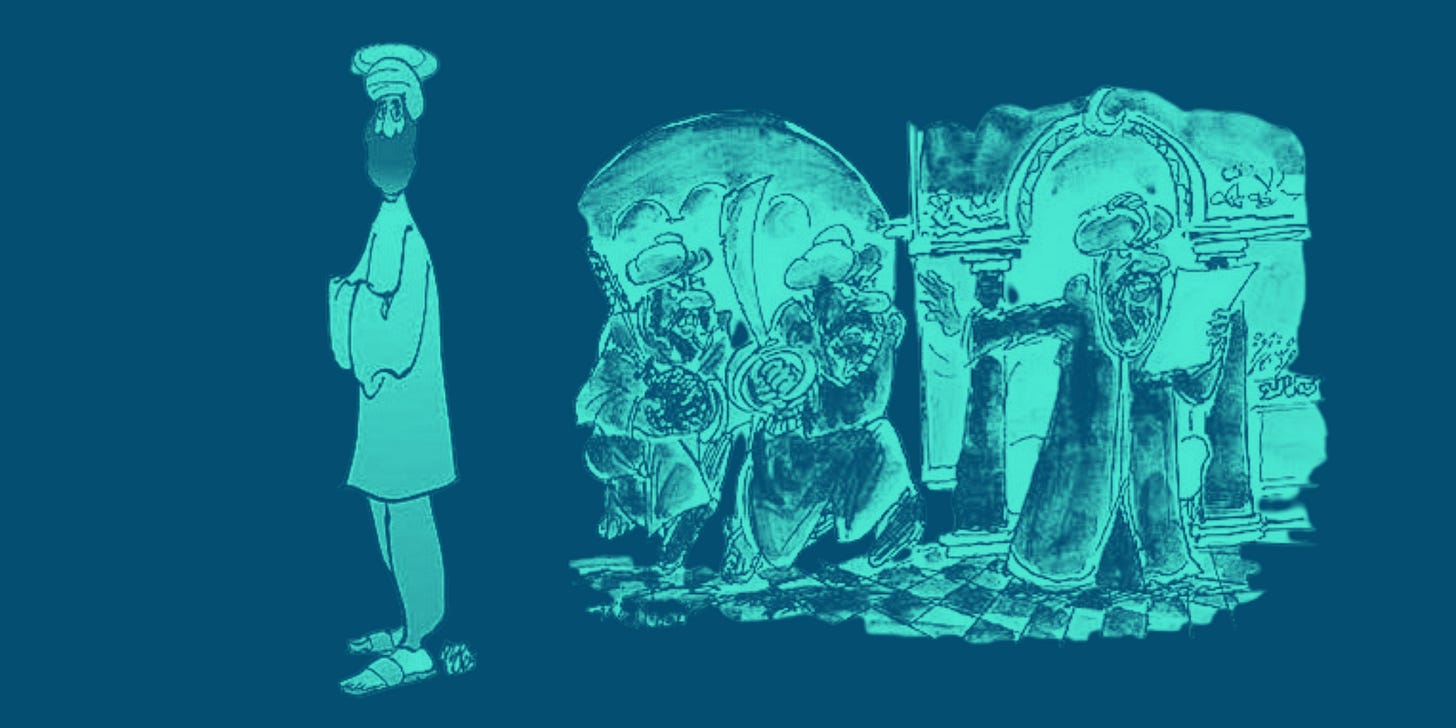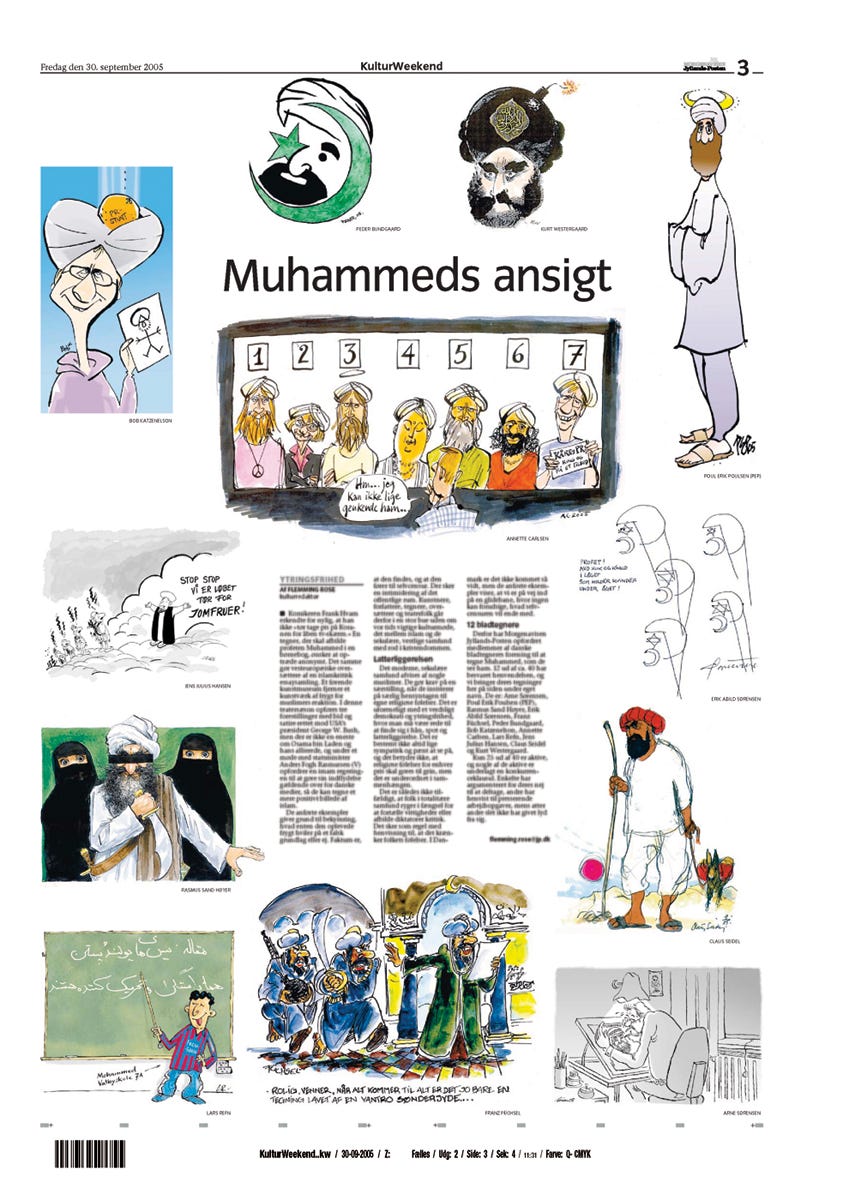20 Years Later: Reflecting on Cartoons, Free Speech, and The Rise of The 'Jihadist's Veto'
Twenty years ago today, a small Danish newspaper dared to publish 12 cartoons. Not bullets, not bombs. Just ink on paper. But those cartoons detonated a global firestorm.
Twenty years ago today, September 30, 2005, a small Danish newspaper dared to publish 12 cartoons. Not bullets, not bombs. Just ink on paper.
But those cartoons detonated a global firestorm, forcing the world to confront a single, searing question: Do democracies still have the courage to defend free speech, even when it offends?
Those drawings of the Prophet Muhammad in Jyllands-Posten challenged the growing shadow of self-censorship. What followed was chaos: riots across the Muslim world, burned embassies, and over 200 lives lost in the violence. It was the birth of what I termed the “jihadist’s veto” — the brutal enforcement of silence through fear, where extremists, not laws, dictate what can be said.
A decade later, that veto struck with deadly precision.
On January 7, 2015, gunmen stormed the offices of French satirical magazine Charlie Hebdo, slaughtering 12 people for reprinting those very cartoons. Satirists and editors gave their lives because they refused to bow to intimidation.
Just weeks after, the horror hit closer to home: In the Copenhagen area where I was born and raised, during a debate on blasphemy and free expression, an attacker opened fire, killing a filmmaker and later targeting a synagogue. The bullets weren’t abstract threats anymore; they were shattering lives in my own city.
Now, 20 years on, while the use of violence to veto speech evolves, it endures and is being entrenched in speech-restrictive laws in some of the world’s traditional bastions of democracy. The Cartoon Crisis was formative for me and one of the main reasons I have dedicated my professional life to advancing free speech.
On this day, I would like to share and quote from a few recent writings that address this issue.
First, an excerpt from my piece today in Persuasion:
Growing up in Denmark in the early 2000s, I rarely worried about my right to free speech. In this cozy haven of liberal values and secular democracy, speaking freely felt as natural as breathing. Few contested this state of affairs, least of all religious groups, whose influence had long since faded.
That outlook changed twenty years ago today. On September 30, 2005, the Danish newspaper Jyllands-Posten published an editorial titled “The Face of Muhammad,” accompanied by 12 cartoons, some of which depicted the Prophet Muhammad. The publication set off a global firestorm and turned criticism of Islam into a minefield that remains deadly to traverse even in open societies. And rather than defending the principle at stake, European democracies are increasingly choosing appeasement—trading away free speech for the promise of a precarious peace.
(For a French version, read this translation in Le Point).
Then, in The Telegraph, I explore how Britain’s justice system first punished a Turkish citizen for a provocative but peaceful protest in which he burned the Quran outside the Turkish consulate in London. Then, it let a man who violently attacked the protestor with a knife off with a suspended prison sentence, since the assailant was “clearly deeply offended” by the Quran burning.
In 1742 David Hume boasted that: “Nothing is more apt to surprise a foreigner than the extreme liberty which we enjoy in this country of communicating whatever we please to the public”. Voltaire saw 18th-century Britain as a paradise of tolerance and freedom that stood in stark contrast to despotic France. Today foreigners are more likely to be shocked by Britain’s determination to eviscerate that proud tradition.
[ . . . ]In essence criticism of religion was transformed into hatred against Muslims: “blasphemy” turned into hate crime. Worse still was the judge’s logic in deeming Coskun’s protest “disorderly”. This was “no better illustrated,” he said, than by the fact that it provoked “serious public disorder” when Coskun was attacked by two different people.
In other words: being violently assaulted turned Coskun’s peaceful protest into a crime, while Kadri, who resorted to violence because he was offended, escaped prison altogether.”
I tackle the broader issue of free speech and blasphemy at the global level in this podcast interview with Daniel James Sharp from The Freethinker.
Two decades from now, I hope free and open societies will look back at their willingness to sacrifice free speech in the face of fanaticism as a shameful era never to be repeated. But that will require concerted efforts to reinvigorate the culture of free speech, which is so clearly eroding in the very part of the world where this freedom was first articulated.
The cartoons were never really about Muhammad. They were about whether democracies would defend the hard edges of freedom—the parts that make us uncomfortable, that offend our sensibilities, that challenge our pieties.
Twenty years later, we’re still failing that test.
Jacob Mchangama is the Executive Director of The Future of Free Speech and a research professor at Vanderbilt University. He is also the author of Free Speech: A History From Socrates to Social Media.
Your support fuels this vital work. To help The Future of Free Speech fight the free speech recession, please consider making a gift on this important anniversary.





In the Orwellian milieu perhaps it is time to update the old adage: "Sticks and stones may break my bones but names will always hurt me."
J'suie, Charlie